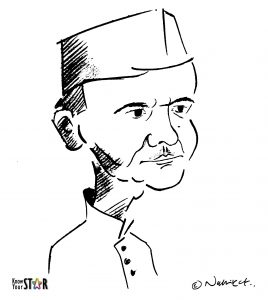The man who coined the famous slogan, ‘JAI JAWAN JAI KISAN’ – which was later to become a war cry for social change, was Lal Bahadur Shastri. Though he held power in various capacities (including that of Prime Minister of India), he is said to have had no change in his personal conduct. In fact, the more prominence he gained, the humbler he became. A real “Aam Aadmi” at heart, he lived in poverty, and died in mystery.
Lal Bahadur Shastri was born on October 2, 1904, to Ramdulari Devi and Sharada Prasad Shrivastava. He shares his birthday with Mahatma Gandhi, the father of our nation. Young Lal Bahadur Shastri used to swim daily across the Ganges to reach school. Bestowed with great memory and self motivation, his school recognized his brilliance and awarded him Rs. 3 scholarship. And it wasn’t only studies in which he outwitted his fellow students. He is said to have been very mischievous too. Due to his impish ways, he was nicknamed ‘Nanhe’ in childhood.
Lal Bahadur was against the prevailing caste system and therefore decided to drop his surname. The title ‘Shastri‘ was given after the completion of his graduation at Kashi Vidyapeeth, Varanasi in 1925. The title ‘Shastri’ refers to a scholar or a person, adept in the holy scriptures. Lal Bahadur Shastri married Lalita Devi. He was against the prevailing ‘dowry system‘ and refused to accept dowry. However, on the repeated urging of his father-in-law, he agreed to accept only five yards of khadi (cotton, usually handspun) cloth as dowry! People used to call him the ‘Homeless Home Minister’!
Lal Bahadur Shastri was the Prime Minister of India at a crucial time in India’s history. The first problem that he had to face after he became the Prime Minister was the one caused by Pakistan, by creating trouble along the borders. Shastri-ji would not yield to this wicked act. Instead, he first tried to earn the goodwill and support of other nations for India. He visited Russia, Egypt, Canada, and Britain to explain their national leaders about India’s stand. He attended a meeting of the non-aligned nations (nations which were neutral) too for the same. Addressing the nation on 15th August 1965, he declared from the ramparts of the Red Fort- “It does not matter if we are destroyed. We will fight to the last to maintain the high honor of the Indian nation and its flag.”
He signed the joint Declaration with Pakistan on 10th January, 1966, at Tashkent, agreeing that armies should withdraw to the old cease-fire Line in Kashmir, and that the two countries should live in peace and friendship. He died the same night. At the end, all he owned was an old car, which he had bought in instalments from the government, and for which he still owed money. He was a member of the Servants of India Society (which included Gandhiji, Lala Lajpat Rai, Gopal Krishna Gokhle) which asked all its members to shun accumulation of private property and remain in public life as servants of people.
Lal Bahadur Shastri was the first person to be posthumously awarded the Bharat Ratna, and a memorial “Vijay Ghat” was built for him in Delhi. Shastriji, the very embodiment of selflessness, detachment and simplicity, had definitely set an example long ago for Indian politicians!
